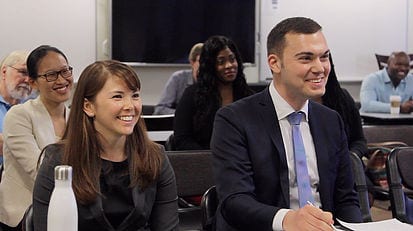By Andrew Cohen

Shortly before the final round of the Roger J. Traynor California Appellate Moot Court Competition, Sebastien Wadier ’20 had a button fall off his suit—and then another off his shirt. “My outfit was held together with safety pins,” he says.
Fortunately for Wadier and partner Jenna Zhang ’20, their arguments held together far better. Competing in their first external competition, the talented tandem won first place by sweeping the best brief and best oral argument awards.
Wadier’s wardrobe malfunction was not the only misleading omen.
“Sebastien and I had both asked to be on the Traynor team because in the past it often dealt with employment law, something we both had prior interest and experience with,” Zhang explains. “We were very surprised when we got the problem and it was a criminal procedure question. Neither of us have taken criminal procedure, so we started with absolutely no background on the subject.”
Open to all law schools in California, the annual event is unique among the competitions Berkeley Law participates in because it uses a real case rather than a mock fact pattern. This year’s case was based on People v. Arredondo, currently up for review with the California Supreme Court.
The case tackles whether police may obtain a warrantless blood sample from an unconscious suspect. The person of interest drove his car away, with passengers, from a party at which he had been drinking. After crashing, he and the others in the car were injured.
He was unconscious when police arrived and arranged for his blood to be drawn, in order to test its blood alcohol content. Charged with driving under the influence of alcohol, he sought to suppress the blood test results, arguing that the warrantless blood draw was unconstitutional.
Many hands on deck
Zhang and Wadier spent ten weeks writing the brief and five preparing for oral argument. A unique Traynor Competition wrinkle is that while each team writes a brief for one side, it orally argues both sides.
They worked under the tutelage of student coach Kelsey Schuetz ’19, the appellate co-director of Berkeley Law’s Board of Advocates, a student organization of people selected for external competition teams.
Many other Board of Advocates students volunteered as judges during practice arguments. Schuetz, practitioner coach Felicity Grisham ’13 (a staff attorney at the U.S. Ninth Circuit Court of Appeals and former Traynor participant), and Professors Jonathan Simon ’87 and Charles Weisselberg also provided input.
Their feedback “helped us develop persuasive themes for both sides of the argument and anticipate questions that would be asked,” says Wadier, a former paralegal.
A valuable piece of advice they received multiple times, he adds: “That it was important to not only answer a question, but show that we sympathized and understood the concerns that motivated it.”
Finding their roles
Zhang and Wadier each chose one of the two issues raised in the record, addressing that issue in the brief and at oral argument.
“It was very important to us that the brief have a unified tone and style, and once we put together a draft we ruthlessly edited it until we each felt completely satisfied with the entire brief,” Wadier says.
Both students cited the chance to work on a team as a meaningful aspect of the moot court experience.
“In the real world you’ll have to work with others and be collaborative,” Zhang says. “Working with a partner throughout the competition and then the whole moot court team during oral argument prep really gives you a collaborative experience you can’t get many other ways in law school.”
This summer, Zhang will work at Covington & Burling in San Francisco and Wadier at Latham & Watkins in Los Angeles. In the fall, Zhang will be a co-director of the Board of Advocates’ Moot Court team.
Zhang says part of her moot court motivation is because “I’m not fond of public speaking and wanted an opportunity to get more practice. Even if you don’t plan on being a litigator who has to speak in court … knowing how to concisely and persuasively convey your points and be responsive to questions is an important skill for any lawyer.”